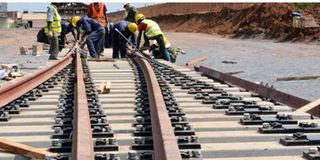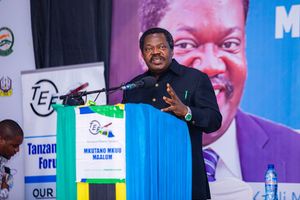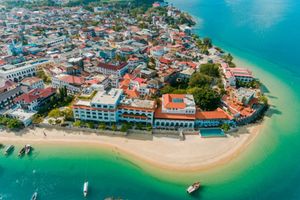Tanzania's private sector ready to grab Standard Gauge Railway opportunities

What you need to know:
- Deliberations by members of the Tanzania Private Sector Foundation (TPSF) just within weeks after the government awarded the contract for the construction of the 341-km Mwanza–Isaka SGR to a partnership of China Civil Engineering Construction (CCEC) and China Railway Construction Corporation (CRCC)
Mwanza. Members of the private sector are working out a plan that will see to them getting a pie of the business that comes with construction of the Mwanza-Isaka section of the standard gauge railway (SGR).
A meeting to deliberate on the involvement of the local business community in the Sh3.0677 trillion- project was held here at the weekend where business leaders got the chance to learn of the available financing options by CRDB Bank’s chief executive officer Abdulmajid Nsekela.
Deliberations by members of the Tanzania Private Sector Foundation (TPSF) just within weeks after the government awarded the contract for the construction of the 341-km Mwanza–Isaka SGR to a partnership of China Civil Engineering Construction (CCEC) and China Railway Construction Corporation (CRCC).
The line will link the port of Mwanza to southern town of Isaka.
It is part of the country’s $6.7 billion SGR project, which was announced in April 2017. When completed, the project will create an inter- national route that connects the Dar es Salaam port to Uganda and Kenya via Lake Victoria through
a split at Isaka and to Burundi, Rwanda and the Democratic Republic of the Congo (DRC). The TPSF chairperson, Ms Angelina Ngalula, told participants at the Mwanza meeting that it was about time that players in the transport sector readied themselves for the opportunities.
“This project brings massive opportunities, and it is up to us to utilize them for the general good of the country and its people,” she said.
The Tanzania Railway Corporation (TRC) director general, Mr Masanja Kadogosa, told participants that lots of jobs will be created for Tanzanians where the line will pass.
Mr Kadogosa said the contractor has been paid some $1.5 million (about Sh3.4 billion) for initial project costs. The Mwanza Regional Commissioner, Mr John Mongella, said traders had a duty of understanding the type of products and services that they would supply to the contractor when actual construction starts.
Earlier, Mr Nsekala said there were a number of financing options that the business community could be looking up to in the implementation of the Sh3.0677 trillion project.
He said CRDB Bank Plc was employing two options in its approach towards the implementation of the country’s mega projects. These include making direct investments in partnership with the government, and through taking care of financing requirements of individual contractors and suppliers.
In 2019, CRDB Bank Plc issued a $20 million overdraft facility and $88 million in terms of Advance Payment and Performance Guarantee in favour of Yepi Merkez, the Turkish construction company, Yapi Markez which is constructing part of the SGR project.
The list of products and solutions that meet the requirements of contractors and suppliers in the SGR project, said Mr Nsekela, include: bid guarantee, performance guarantee and advance payment guarantees.
‘Bid Guarantee’ is a form of security assuring that the bidder will not withdraw a bid within the period specified for acceptance and will execute a written con- tract and furnish required bonds while performance guarantee is a document that legally confirms that the contractor will complete the contract you have undertaken.
The advance payment guarantee is a bond that provides that if the seller or contractor fails to meet its contractual obligations, the issuer will refund the advance payments made by the buyer or employer.
“Through our purchase order financing and invoice discounting, we also issue loans that help contractors and suppliers so they can execute projects effectively, efficiently and in a professional manner,” he said.
Construction of the first and the second phase of the SGR is being undertaken by Turkish construction company, Yapi Markez (see related article on page 3).
The first phase will have six main stations at Dar es Salaam, Pugu, Soga, Ruvu, Ngerengere and Morogoro, with the Dar es Salaam and Morogoro stations being the largest.
The second phase, which is already under implementation, involves the construction of 422km between Morogoro and Makutupora in Singida with the project set to be completed within 36 months at a cost of $1,924 billion.
The railway will be East Africa’s fastest and will use electricity to move trains travelling at 160km per hour and transport 10,000 tonnes of freight at once.
This is equivalent to 500 cargo trucks. Upon completion, the SGR project is expected to pay back the investment value after 15 years.
In a related development, in October 2020, the Tanzania government signed a $60 million (about Sh138 billion) contract with a South Korean firm to sup- ply trains for the standard gauge railway (SGR)




